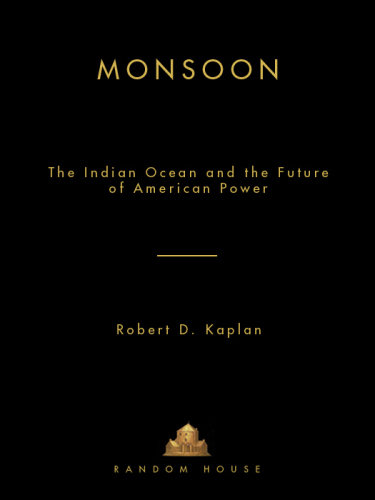
Monsoon
The Indian Ocean and the Future of American Power
کتاب های مرتبط
- اطلاعات
- نقد و بررسی
- دیدگاه کاربران
نقد و بررسی

Starred review from July 5, 2010
Kaplan (Balkan Ghosts), correspondent for the Atlantic Monthly, inculcates a paradigm shift when he suggests that the site of 21st-century geopolitical significance will be the Indian Ocean, not the northern Atlantic. The major powers of the future—India and China—fringe the ocean along with a host of other players—"the emerging and volatile democracies of East Africa," Indonesia, Oman, "anarchic" Somalia, placid Singapore, and Burma. These sea trade routes have historically borne commerce, colonialism, and faith, and Kaplan examines the nexuses of power, goods, and ideologies making their way across those waters today. Even if the writing on culture—especially India's—can devolve into cliché, the book's political and economic focus and forecasts are smart and brim with aperçus on the intersection of power, politics, and resource consumption (especially water), and give full weight to the impact of colonialism. An ambitious and prescient study equally at ease analyzing the work of the Indian poet Rabindranath Tagore, the finer points of the Indian state of Gujarat's flirtation with fascism, and the economic impact of the Asian tsunami on Indonesia.

July 1, 2010
An ambitious, somewhat amorphous look at the many "transition zone[s]" comprising traditional trading posts along the Indian Ocean that are now emerging as important strategic flashpoints.
A well-traveled author and fellow at the Center for a New American Security, Atlantic Monthly national correspondent Kaplan (Imperial Grunts: The American Military on the Ground, 2005, etc.) hops among the countries making up the "rimland" of the Indian Ocean for a busy look at the ethnically rich "central theater of conflict and competition," of intense interest to the United States, China and India. This is the ocean to which Marco Polo devoted his Travels; where Vasco da Gama's voyage in 1498 inaugurated important sea routes for the Portuguese; where Prince Henry the Navigator dreamed of "outflanking the Muslim world" and Lord Curzon, viceroy from 1899-1905, presided over a powerful Greater India, influencing affairs from Aden to Malacca to London. Today, with the Indian Ocean comprising nearly one half of the world's container traffic—and 70 percent of the traffic in the world's petroleum products—this is a strategic swath indeed, where "China expands vertically, India horizontally," and America, happily ensconced between the Atlantic and Pacific oceans, barely grasps the geography. Kaplan gives a smattering of history and contemporary issues for each hotspot, touching on the separatist rebellions of Balochistan and Sindh, which make up Pakistan's 400-mile Makran coast, also the scene of Arab conquests in the eight and ninth centuries. The author also provides a mini-biography of Pakistan's founder, Mohammed Ali Jinnah, and examines the troubled histories of Gujarat, Kolkata (formerly Calcutta) and densely populated Bangladesh, beset by monsoons, now a "perfect place for al-Qaeda affiliates"; and how China is keeping its strategic eye on Sri Lanka and Burma.
A useful, teeming point of departure for exploring these up-and-coming Eurasian dynamos.
(COPYRIGHT (2010) KIRKUS REVIEWS/NIELSEN BUSINESS MEDIA, INC. ALL RIGHTS RESERVED.)

August 1, 2010
The Indian Ocean has been a major commercial trading area for many centuries. Kaplan (Imperial Grunts: On the Ground with the American Military, from Mongolia to the Philippines to Iraq and Beyond) asserts that it is the most important such commercial area, carrying half the world's container shipments and even more oil trade. The littoral states on the southern edge of Eurasia are vital to U.S. interests because of the two current U.S. wars, the oil reserves there, and the large Muslim populations. Rising powers China and India rely on it for their trade. Kaplan takes readers on a tour of the region, including East Africa, Oman, Pakistan, India, Bangladesh, Sri Lanka, Burma, and Indonesia, explaining in each case the state's historical reliance on the Indian Ocean and relationships with neighboring states as well as its importance to vital U.S. interests. VERDICT The result is a rich portrait of geopolitical complexity--it is not policy prescriptive but emphasizes that the players in the region deserve increased attention from Western policymakers. Many pundits and sources can seem overly simplistic and bellicose in their foreign policy recommendations. This more nuanced discussion will appeal to thoughtful readers of current events and international affairs.--Marcia L. Sprules, Council on Foreign Relations Lib., New York
Copyright 2010 Library Journal, LLC Used with permission.

September 15, 2010
An inveterate traveler and author, Kaplan recently toured the rim of the Indian Ocean to inspect its geopolitics. Perspectives on the balance of power vary from country to country and speaker to speaker, but most agree that India and China are the ascending powers in the region. As Kaplans passages about Indian Ocean history reflect, the two countries can refer to tradition (to the fifteenth-century fleets of Zheng He, in Chinas case) for their contemporary activities in the Indian Ocean, but the plain fact is they are busy for one reason: access to resources. As Kaplan journeys from Oman to Pakistan to Burma and Indonesia, the specific raw material comes into focus, as does the geopolitical angle of safely shipping it to the interested country. Touching on what could threaten maritime traffic, such as piracy, ethnic conflicts, or hostile control of choke points like the Strait of Malacca, Kaplan is guardedly optimistic that interested powers, including the U.S., can benignly manage their Indian Ocean affairs. A better-informed world-affairs reader will be the result of Kaplans latest title.(Reprinted with permission of Booklist, copyright 2010, American Library Association.)

























دیدگاه کاربران